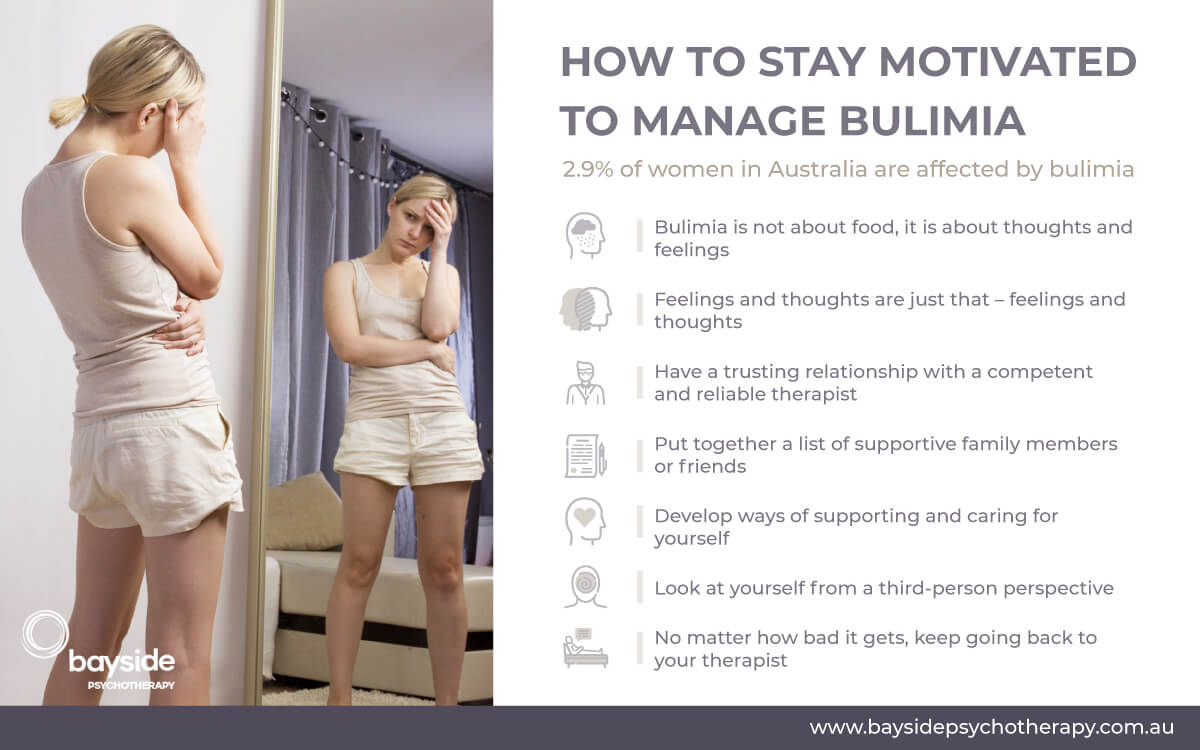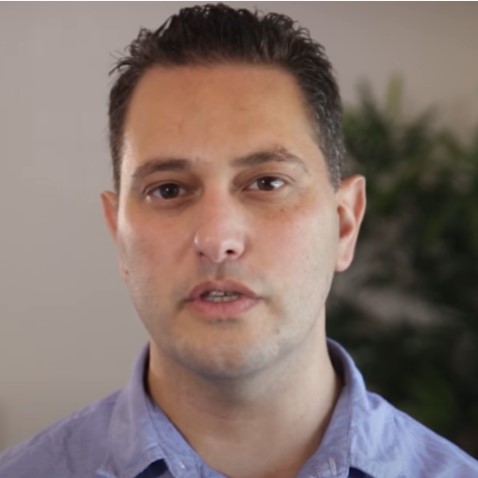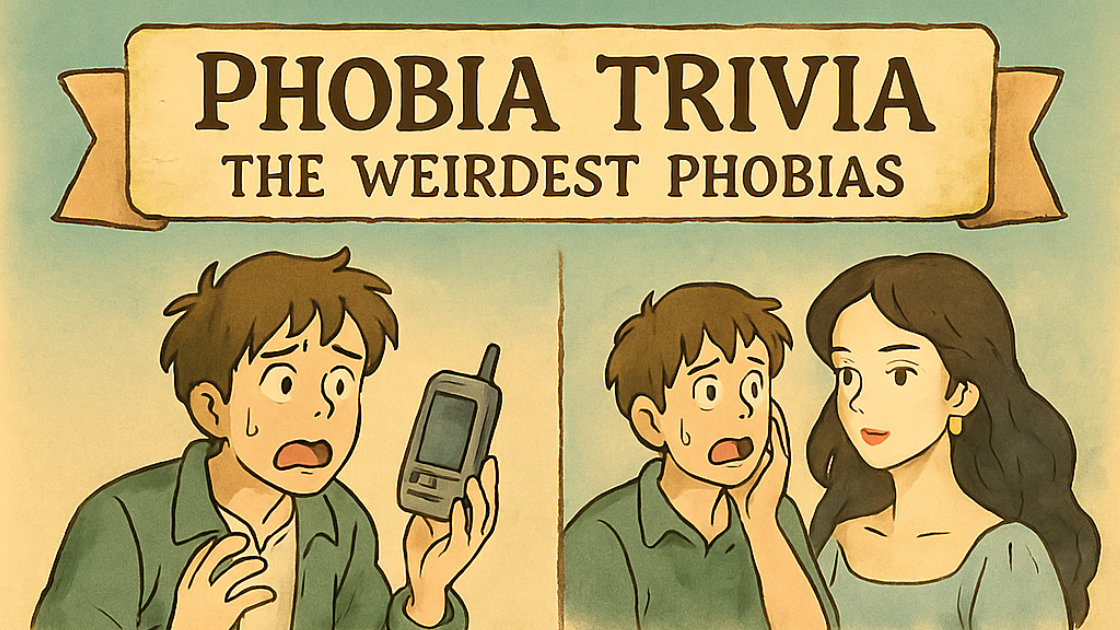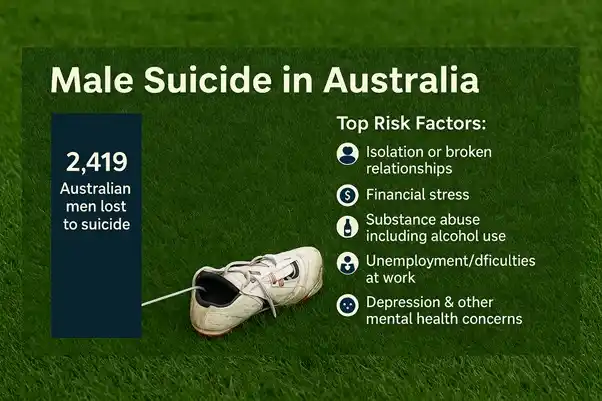How to stay motivated to manage bulimia
This article was updated on 28 October 2021, after being first published on 22 December 2013.
Bulimia is a common yet highly distressing disorder impacting up to 2.9% of women in Australia. It involves phases of eating huge quantities of food in an uncontrollable manner followed by behaviours to avoid weight gain including vomiting, using laxatives, diuretics or other diet pills, or excessive exercises. These behaviours must continue once per week for three months to qualify for a DSM diagnosis of bulimia.
While bulimia appears to be about food on the surface, the underlying contributing factors are both hereditary and environmental. Individuals with eating disorders including bulimia have often experienced trauma of some sort in their formative years and have been unable to form close and trusting bonds with their parents while simultaneously developing an autonomous and independent sense of self and identity. This can leave people struggling to make sense of thoughts and feelings and unable to manage them in an adaptive way. Food is often used to dull, change or avoid feelings and thoughts that seem overwhelming or unacceptable and a threat to self-esteem, self-cohesion and to important relationships.

Here are some extremely important ideas to help you stay focused in your journey to recover from bulimia:
1. Bulimia is not about food it is about thoughts and feelings that cannot be processed and seem frightening or threatening to an individual’s self-esteem, to important relationships and to their ongoing sense of identity.
2. Feelings and thoughts are just that – feelings and thoughts. To feel something or think something does not make you bad, weak, horrible or worthless. It makes you human.
3. It is important that other more adaptive coping mechanisms are put in place before trying to shift out of bulimic behaviours. To start with it is imperative to have a good therapist who is experienced and comfortable working with eating disorders and equally importantly is trustworthy, empathic, caring and reliable. Once a level of trust and attachment has been established, problematic relationship styles and previously warded-off feelings may start to emerge. Although this can be incredibly painful and difficult, it is a crucial component in the healing process. Remember bulimia often comes out of difficult or traumatic relationship experiences and having the opportunity to re-work these problematic encounters can begin to break the cycle.
4. As well as having a trusting relationship with a competent and reliable therapist, it is important to develop other emotion regulation strategies. While your relationship with your therapist is an important source of support, they are not always going to be available, therefore it can help to put together a list of supportive family members or friends to lean on. Simultaneously it is very important to develop ways of supporting and caring for yourself. Some common ways people manage their distress in a healthy manner include going for a walk, taking a bath, reading a good book, and watching a DVD. These are especially important to have on hand when you are tempted to binge or purge.
5. Developing and returning to a mindful stance when distressed is one of the key goals in working with any sort of psychological problem. A mindful stance is one where you take a third-person perspective and observe what is going on in terms of thoughts and feelings, rather than “being” them or being engulfed by them. Trauma and interpersonal neglect tends to inhibit the development of these abilities but through working with a therapist, you can gradually acquire these skills. A mindful stance also involves simply watching thoughts or feelings without attaching judgments to them. Remember, thoughts and feelings are simply thoughts and feelings.
6. When tempted by a bulimic cycle, try to find a quiet spot and practice your mindful stance. Make yourself comfortable and focus your attention on your breathing. Try to notice what thoughts and feelings are flickering through your mind.
7. Bulimia, like any eating disorder, is a difficult illness to recover from and it may take a long time and involve periods of frustration and hopelessness. The recovery is likely to be rocky and imperfect and it is so important to not lose hope that things can change or forget that you are worth all the effort and deserve to be well and live a full and happy life especially when you feel frustrated, lost and that your situation is hopeless.
8. No matter how bad it gets, keep going back to your therapist and keep talking about what you are thinking and feeling. As strange as it sounds, it is the way out of the nightmare that is bulimia.
It can help to write these down for later reflection and to share with your therapist.
Here are a couple of blogs written on this topic you might find useful:
What Are Australians Most Afraid Of? N...
From snakes and spiders to needles and ghosts, fear takes many forms. But what do Australians fear most in 2025? At Bayside Psychotherapy, our expert.
Is It Time For The AFL To Cast A Menta...
At Bayside Psychotherapy we are passionate about mental health and like many fellow Melbournians, many on our team are avid AFL fans. So when two of our.
Exploring Emerging Therapies: Understa...
At Mind Medicine Australia, we are dedicated to transforming the trea.
The Balance of Power in Romantic Relat...
Why do some relationships thrive while others feel like a constant tug-of-war? Power dynamics lie at the heart of this balance.











